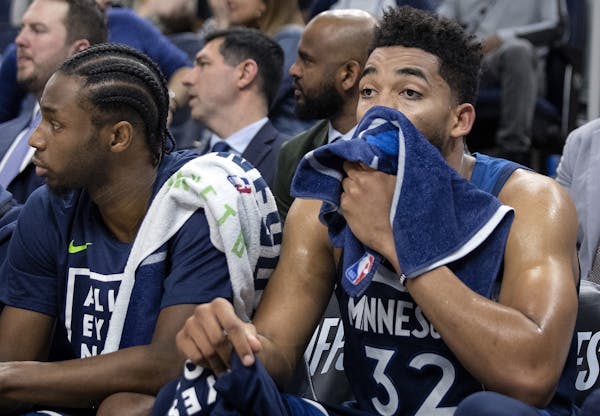As fans were filing out of the Target Center following Monday's 119-100 Rockets victory over the Timberwolves, the public address announcer said, "We'll see you Friday" referencing a potential Game 6. One fan shared a sarcastic laugh with one of the security guards.
"Yep. We'll see you Friday," he said and continued to walk out of the arena, laughing.
You couldn't help but feel an air of finality to the series as the Rockets took a 3-1 lead. They did so thanks to an incredible 50-point third quarter, which, if you stuck around for the end of it, you saw a piece of NBA history.
The Rockets became just the second team in NBA history to score 50 points on an opponent in a quarter in the playoffs, according to Basketball-reference.com. The first was the Los Angeles Lakers, who hung 51 points in a 132-125 losing effort against the Pistons on March 31, 1962.
(Elgin Baylor had 37 points in that game on 12 of 32 shooting. Jerry West scored 22 points on 10 of 28 shooting. ... Those guys won't get far if they shoot like that.)
The Rockets became the 40th team in NBA history to score 50 in a quarter. The last team to do it was the Warriors on Feb. 23, 2017. It was the first 50-point quarter in Rockets history, and the first time the Wolves have ever allowed such a thing. The 30-point differential in the quarter tied a playoff record.
Rockets coach Mike D'Antoni said it was a goal for his team to score 50 points in a quarter since he took over as coach.
"It was a good time to do it..." D'Antoni said. "We have enough shooters that things will eventually go in."
In the 14 quarters prior to the 50-point barrage, the Rockets were struggling from three-point range, at least compared to their lofty standards, and they were just 7 of 25 in the first half. On a night of nice round numbers, they had 50 points at halftime.
Then they course-corrected in a hurry.
The Rockets hit 9 of 13 three-pointers in the third quarter with Rockets guard James Harden scoring 22 of his 36 points in the third on 7 of 10 shooting.
"We gave (Harden) a steady dose of layups and when he saw some layups going in, his three-pointers started coming," guard Jeff Teague said. "You get a couple of easy buckets, the rim opens up for you."
It was here in this third quarter when the Wolves' tendency all series to allow the Rockets to shoot open three-pointers finally caught up to them. The Rockets shot 11 threes in the quarter that were considered either "open" (a defender was four to six feet away) or "wide open" (a defender was six feet or more away), according to NBA.com. The Rockets hit eight of them.
Guard Chris Paul added 15 of his 25 in the barrage the Wolves feared all series would come.
"This is a really explosive team," Wolves coach Tom Thibodeau said. "(Chris) Paul and Harden, they were a load. … I thought we'd respond a little bit better than we did."
Added Jamal Crawford: "Once things get rolling, they're really good."
Things got rolling all the way into an avalanche.
Rose makes the most of minutes — again
As usual, Jimmy Butler led the Wolves in minutes (38 minutes, 6 seconds), but the player with the second-most minutes might surprise you: Derrick Rose (32:25). If you saw Rose's first half, you know why Thibodeau kept him in.
Rose picked up from his stellar Game 3 and scored 17 points on 7 of 11 shooting — though he did have four turnovers. Rose was one of the few Wolves players to have a positive plus-minus rating (plus-six). That's because Thibodeau kept him on the bench for most of the Rockets onslaught in the third quarter. Rose didn't check in until the 5:41 mark of the third quarter. By that time, the Rockets had turned their 50-49 halftime lead into a 75-54 lead. After the game, Thibodeau said he was fine with how he managed his substitutions.
Gibson disappearing
Taj Gibson injured his neck late in the regular season and it's fair to wonder just how much the injury may be bothering Gibson. He finished Monday with just one shot attempt and three rebounds in 20 minutes.
For the series, Gibson has a usage rate of 9.6 percent — meaning when he is on the floor, a Wolves possession ends with Gibson attempting a shot, committing a turnover or going to the free-throw line 9.6 percent of the time. During the regular season, that number was 14.7 percent. Gibson was never the focal point of the offense, but he was more involved in the regular season than he is now.
Chris Hine is the lead writer for North Score, the Star Tribune's sports analytics beat. startribune.com/northscore E-mail: chris.hine@startribune.com
Jordan Montgomery wins in debut, Diamondbacks get 22 hits in 17-1 win over Giants
Ingram, Valanciunas lift Zion-less Pelicans past Kings and into the playoffs
Justin Turner's homer, RBI single highlight Blue Jays' 5-1 win over the Padres
![Minnesota Twins pitcher Jhoan Duran (59) in the ninth inning Tuesday, August 15, 2023, Target Field in Minneapolis, Minn. ] CARLOS GONZALEZ • carlos](https://arc.stimg.co/startribunemedia/NWLT5CNXGTRZA6KVTMIPSOG3KI.jpg?h=91&w=145&fit=crop&bg=999&crop=faces)
